Morality Is Subjective
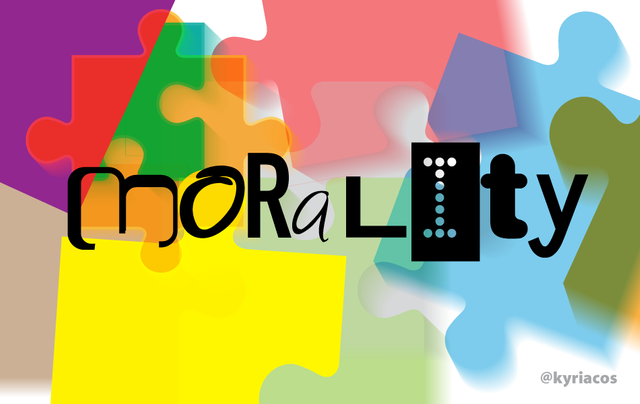
What one understands as moral can be perceived as immoral from someone else. Although this is pretty straightforward, the vast majority of people believe that morality can be objective. Myriads of political conflicts and religious ideologies have yet to convince us about this simple reality.
Being part of a religion or adhering to a political ideology does not make something or someone “moral”. Morality is a set of agreed principles, confined within a group of people at a certain point in time. Beyond the premises of a certain group, morality is nothing more than a set of random accepted practises. Even within a group, members can disagree about morality depending on their unique placement in a given situation.
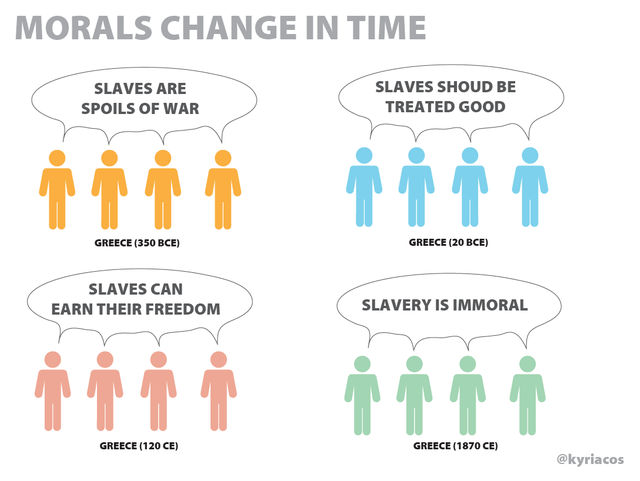
Religious books cannot and do not answer universal questions about morality since themselves are often contradictory. Gods might kill in one instance while salvage on another. Politicians leading countries or soldiers killing each other, follow much the same moral logic. Sometimes it is ok to kill for the “greater good” —as some people put it in order to excuse their actions. It seems that most of us shape our morality towards the end result, ignoring the means we use to reach it. This is the first truth about the subjective nature of morality: it is perceived sequential to an event, not as a whole.
Philosophy much like religion have tried to address issues of morality with a-priori (pre-existing) sets of truths. They have failed equally. There is no such thing as "pre-existing morality". Morality is something that is constructed and disassembled much like a sand dune
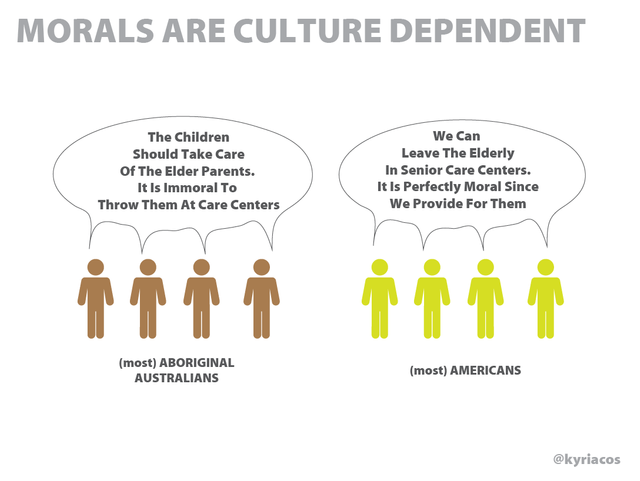
We can never delve completely into an objective moral critique when it comes to a event. We might get exposed to fact 1,4 and 5 while fact 2, 7 and 8 will be missing from our perspective. This is the simple reason why objective morality is impossible. Every single human perceives a set of events differently. Every single human judges and acts on something based on their own unique premises.
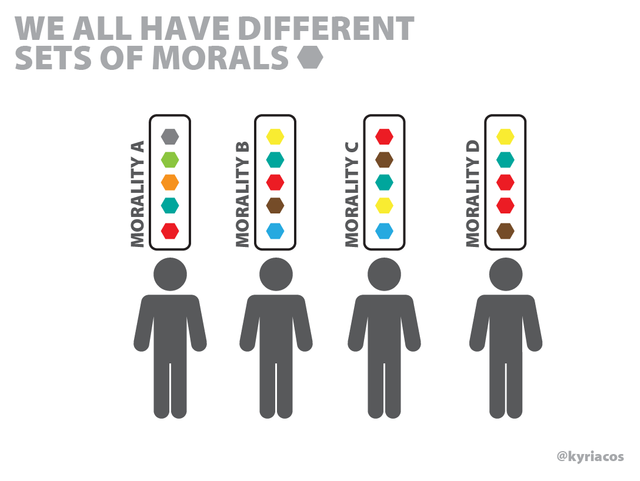
Our own physiology is diverse enough from one another so that our hormones and neurotransmitters can shape our morality differently from one another. Researchers even found that even a single cup of warm vs cold coffee can change entirely how one behaves. Imagine what an impact this can have in a political room with people with different diets. Imagine what impact on our morality our food has, the medication we take or the drugs (illicit or not) we do. Just our physiology alone makes morality vastly subjective.
In the grand scheme of things, the very fact that there are thousands of religions, political ideologies and judiciary systems across the world—ranging massively since the dawn of human history—demonstrates how subjective morality is. Nonetheless, it seems that in almost every religious or political debate people are going to bring their own set of morality without first asking if one accepts the premises of the opposite party.
People want to believe that morality, their own morality, can be objective so we can all get along. Quite the opposite is true. The fact we don't accept morality as subjective creates conflict around us.
A Democrat or a Republican might defend their country's action to war much like an anarchist living off the grid in Australia might decide its OK to kill someone that crosses their own private property. He might even kill because a certain individual looks like his abusive father or because he is mentally unstable. We cannot objectively judge people about their moral actions unless we know the entire trail of their own history—and it is rather impossible to know each and everyone’s moral history. Most of our memories are not even real. We cannot even totally know and understand our own self; how can we judge objectively the morality of others?
Take any individual, every criminal serving a sentence, every soldier and emperor that ever lived on this planet and they will present their case in a way that is morally justifiable. Even if we take the example of voluntaryism or anarchy we will still find people that perceive “initiation of violence” and "coercsion" vastly different from one another.
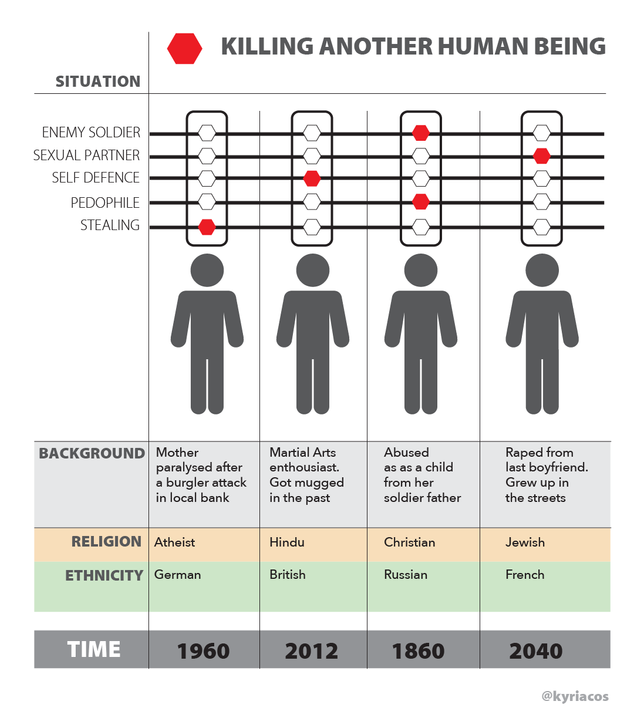
In our crypto world, an an-cap bitcoin exchange-whale might steal another person’s money through a "legal" scam, disabling one’s livelihood that might even bring death to their sick child. Is it justifiable for the victim to go and kill the scammer when the first just exploited the market? How does the victim perceive the market and its dangers? Can we all agree whether what occurred between these two people was moral or immoral?
Morality is as subjective as your unique 16 digit password. Even though you might agree with some letters and digits at some instances with some people, the actual sequential representation remains vastly different.
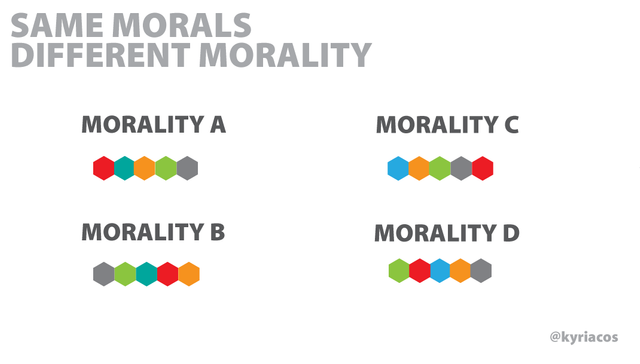
We were all born over the last 100 years. What we have come to know and understand as moral is nothing more than the cumulative perceptions of those around us. Much like people who lived thousands of years ago before us, we come from different cultures, different backgrounds and different ideological beliefs about the world. Morality is just a fancy word we invented in order to agree on how we would act upon something at a given time; we still rarely agree.
The solution does not lie in enforcing morality on others but rather creating communities that accept our own set of subjective morality. We are here as a species because we are different from one another. Life exists because of things being different—spontaneously claiming order over given instances in time-space. Morality is no different.

You need to understand the purpose of morality to arrive at an objective moral standard and objective virtues. Morality is objective.
http://aynrandlexicon.com/lexicon/standard_of_value.html
arguing with relativists is pointless. not having the constraints of logic allows them to make up anything they want. the conflation of logic as a dynamic derived from natural law, and the internal logic of a system constructed of subjectivity seems to be the crux of this. the intellectually honest will eventually see the truth. the rest will believe whatever they want. true believers are not to be convinced otherwise.
What the fuck you are talking about?
How can you be absolute in a world you can barely understand of even grasp? Do you think philosophy is just shoving your head up your ass the being absolute about things? Almost everything you know and understand comes from another source. Every single input comes from sources beyond your control that begins with your genes and ends with your limited senses.
The intellectually honest accept ignorance since day by day what you know as true changes. If you dount any of this check history.
You are the true believee. The absolutist, the "objectivist" that does not allow room for doubt.
i wasn't trying to be a jerk. i probably failed. i'm good at that.
@mughat
-1-People understand the same purpose differently based on their own unique perspectives.
-2-Nothing is objective in this world. I dare you to find one thing that is objective.
-3-Virtues are not objective (e.g being fat for some is not a virtue, for others it is).
Again. the fact that we disagree proves my point.
"Objectivity is both a metaphysical and an epistemological concept. It pertains to the relationship of consciousness to existence. Metaphysically, it is the recognition of the fact that reality exists independent of any perceiver’s consciousness. Epistemologically, it is the recognition of the fact that a perceiver’s (man’s) consciousness must acquire knowledge of reality by certain means (reason) in accordance with certain rules (logic). This means that although reality is immutable and, in any given context, only one answer is true, the truth is not automatically available to a human consciousness and can be obtained only by a certain mental process which is required of every man who seeks knowledge—that there is no substitute for this process, no escape from the responsibility for it, no shortcuts, no special revelations to privileged observers—and that there can be no such thing as a final “authority” in matters pertaining to human knowledge. Metaphysically, the only authority is reality; epistemologically—one’s own mind. The first is the ultimate arbiter of the second.
The concept of objectivity contains the reason why the question “Who decides what is right or wrong?” is wrong. Nobody “decides.” Nature does not decide—it merely is; man does not decide, in issues of knowledge, he merely observes that which is. When it comes to applying his knowledge, man decides what he chooses to do, according to what he has learned, remembering that the basic principle of rational action in all aspects of human existence, is: “Nature, to be commanded, must be obeyed.” This means that man does not create reality and can achieve his values only by making his decisions consonant with the facts of reality." http://aynrandlexicon.com/lexicon/objectivity.html
I've tried to explain this exact point to many people with limited success. Most people don't understand that morality is very fluid and depends on the situation, culture and context. The example I always used to use was of someone who is starving stealing bread to survive - in most cases people can accept that that is a case where it is not immoral to steal. The things is the exact point at which you draw the line varies from person to person. The ultimate rule I suppose is that survival trumps anything and can overrule most if not all moral codes.
@thecryptofiend
I don't think that they don't understand. They do understand but they don't want to accept the fact that their own ideology is not universal. Almost all ideologies carry a moral imperative and shaking it causes uneasiness.
Indeed nature doesn't care about morality and this is evident all around us. Survival is all there is.
My favorite article so far, although i haven't been doing this very long. I am always trying to find new ways think about situations that people around me get themselves into without being dismissive. I believe that this article and all of the thoughtful comments i have read have already helped me to do so.
Very cool article, never studied morality before and to be honest didnt know anything about it! thanks for sharing!
glad you enjoy it my friend
Morality is mostly subjective. That does not mean there cannot be philosophical investigation that can reveal some views are better or even somewhat more objective then others. Depends on how you define morality, I assume.
The fact that people in different communities hold different views can simply mean some are wrong. All moral philosophy needs to have axioms, let’s call them the fundamental principles, the paradigm. These cannot be debated really. But that does not mean some are not better than others.
Creating communities that accept our own set of subjective morality works until one community massacres the other. For fun and profit. Except the few which it enslaves one would assume.
Me, I split morality in things that do or do not violate the basic liberty of others. Whether it is OK to have sex before marriage or not is a purely subjective issue. Is it OK to have sex before marriage by raping someone no longer is subjective. Because it leaves your personal subjective sphere and enters another ones.
"That does not mean there cannot be philosophical investigation that can reveal some views are better or even somewhat more objective then others."
What is "better" morality is the one that survives—even if it means killing. Look around you the state of the world. Obviously murder is still justifiable for fighting over imaginary borders. it survives instead of "peace" not because it is superior but bcause it eliminates the opposite view.
"The fact that people in different communities hold different views can simply mean some are wrong. "
What is better or worse, what is wrong or right is subjective depending on a given situation.
"Me, I split morality in things that do or do not violate the basic liberty of others."
Do you buy cheap chinese t-shirts from potential chinese labour-slave camps. probably you do without knowing it. Most of conflict around us is created on this. small events not in our perception, creating massive black swans. this is why most of the world is pissed with Americans.
"Is it OK to have sex before marriage by raping someone no longer is subjective."
It might be if you are the last healthy male and you have to procreate the species. Again time-space is important and this is why morality cannot be objective.
The state of the world does not say much. The fact that murder takes place does not mean it is justifiable. It may also simply mean people are immoral. Any one you ask: is it OK if someone just comes and murders you, they will say no. It seems to me that being murdered is considered universally wrong (99.99%). If these people think it is OK for them to murder others it just shows inconsistent thinking. Not that murder is acceptable.
I don't think black swan means what you think it means.
"The fact that murder takes place does not mean it is justifiable."
It actually means that. it means that people, the vast majority accept it as part of our moral reality.
"ny one you ask: is it OK if someone just comes and murders you, they will say no."
True but that doesn't mean anything other than we share the same moral, not the same morality. Read my article again. I actually have a picture illustrating this point.
" If these people think it is OK for them to murder others it just shows inconsistent thinking."
not really since there are different cases where murder is ok. e.g at war or dfending onself. again. context is vital.
"I don't think black swan means what you think it means."
oh yes it is. small occurances of small non important moral event such as slave-camps in india and china or africa create political conflict, overthrow goverments and then we get the refugees hating the western citizens that keep their employers enslaving them.
don't worry i read the book. it applies to economics as much as it applies to morality.
"we share the same moral, not the same morality"
I think we partly share the same "ethics" ("don't kill other peaceful people"-ish), but likely not the core moral ideals that we have chosen and that we can call "morality".
@mughat: I both agree and disagree with @kyriacos
An object itself is objective but it cannot be described objectively.
Everything else is subjective, given subjectivity is the expression of the perception an individual (the subject) has on objects or concepts.
The description of the object or concept is not the object or concept itself.
I am the subject (author) of my perception/conception as you are the subject of your own.
Concepts like morality, values, virtue are by essence subjective as they have no existence by themselves and are only the expression (shared or not) of each individual (the subjects) perception.
People tend to reject the notion of "subjective" because it has a negative connotation.
They prefer the term "objective" because associated to the immutability of the object, therefore more "trust-able".
I love to be subjective rather than objective because I can involve myself in the first term, not in the second.
well, you agree with me.
although reality if "objective" humans that invented the term can only perceive it subjectively through their limited senses.
Full disclosure - I didn't read 100% of this post, so please forgive me if I failed to fully appreciate all you said here.
However, one very important aspect of morality that is objective is its' universal nature. The objective logic of the Non Aggression Principle cannot be disputed (but I'm sure you'll try).
Let's use an extreme form of aggression like murder. Aside from people who want to commit suicide (and if they really want to they can do that on their own anyway) every healthy person wants to live. That's about as universal as it gets. So by extension it's logical and universal to prohibit aggression for this reason. Masochists and pain lovers are not exempted, they have the right to that if they wish, as long as others are not forced to provide it. It is when one being coerces, manipulates (without full disclosure), or outright forces their will upon another that the initiation of force becomes immoral.
I truly hope one day you will come to realize this basic understanding of morality and the fundamental principles that allow you to be you and me to be me, as individuals free to pursue or own path in life without intimidation or aggression from others.
@full-steem-ahead
ofcourse the NAP can be disputed. I am voluntaryist myself and I can see it's limitations. Read the part in the text where i bring the example with a NAP trader using the "legal" way to scam the market that might result in somebody's indirect death.
So initiation takes a totally different spin when you are at the other end of the rope. Voluntaryism really doesn't offer any real solutions unless people sit around and decide what constitutes violence, direct and indirect.
my example:
"In our crypto world, an an-cap bitcoin exchange-whale might steal another person’s money through a "legal" scam, disabling one’s livelihood that might even bring death to their sick child. Is it justifiable for the victim to go and kill the scammer when the first just exploited the market? How does the victim perceive the market and its dangers? Can we all agree whether what occurred between these two people was moral or immoral?"
This post should be taught in moral classes. And I think this is rather different from the usual discussion between moral relativism vs moral absolutism (which is, of course just another mental construct like the non-aggression principle, only appreciable by the human mind)
@kevingwong
Indeed, people seem to get caught up is philosophical jargon. I thnk the most important thing for a philosopher today is to first study science. Philosophy without a scientific background is jargon sophistry.
Morality is subjective. Lets teach that in moral class.
Why bother having moral classes if morality is subjective?
Isn't that like saying, They should teach voluntaryism, in civics class.
Seriously. We don't need moral class, with so called experts or professors or scientists.
Morality is subjective, only an individual with all his subjectivity can have a concept of morality and maybe choose moral principles, although choice is also subjective. But he's free to choose to believe he has a choice to see morality as objective and live by certain principals, that's the funny thing of life.
Or maybe an individual just lives his life without ever thinking about morality. Does that even matter.
Why even bother talking about morality? If morality is subjective?
And getting science or the scientific method involved doesn't make morality more objective or measurable……..that is…....if you truly believe morality is subjective.
You can't proof that morality is subjective……... or objective for that “matter”
That's proofs for it's subjectiveness for the believers that say: “Morality is subjective and that's the objective truth…. believe me...I studied science first and than philosophy so I'm an authority on morality.
The people that say morality is subjective, are distracting people with sophist rhetoric in the meanwhile stealing, aggressing against and murdering everyone around them, and saying to their victim's that they must proof theft is theft, aggression is aggression and murder is murder and that morality must be proven as being objective before their victim's can call the thief a thief, the aggressor aggressor, and the murderer, murderer. This game is called politics, and I'm not playing.
If this is the definition of moral:
Then your argument is:
Does that mean something else than that people have different values?
Or is your argument:
EDIT: I think I understand. What you're saying is that moral, as a concept, should be understood by definition as a local agreement on values, not a universal agreement.
exactly
Morality can not be an agreement on values, morality is a concept, it does not exist, is subjective.
The same goes for values, values are subjective, a concept, they don't exist.
You can't have an agreement on things that are concepts and are subjective, for an agreement is also a concept, and is subjective.
You can only have an agreement if you determine the words agreement, morality, values. And both agree that there are such a things as morality, and values, and agreement, in other words, sort of, make them objective. If one of the human in the agreement sees everything as subjective, there is no agreement.
How could there be.
An agreement comes with determining words,
An agreement in the form of a contract comes with, keeping your word, how can someone keep their word if they are not willing to determine what the words mean?
The first title was to be "morality does not exist" but i ended up with just saying it is subjective. i get what you say though.
i'd say morality IS objective and it depends upon private property rights. Don't violate the rights of others. We all have the universal ability to understand aggression against our property either personal or other. None of us like to be stolen from for example, even thieves themselves.
Also disagreeing with your premise doesn't in any way reaffirm your argument... from what I can see anyways :)
I'd say you need to open more books besides libertarian ones.
What you perceive as "rights of others" are different from culture to culture. For example muslims have agreed that they have a right to stone someone that sins. Is their right. they have books and agreements about it.
No we don't all have the universal ability to undertand aggresion since every piece of land you see around you, including your own has been violently conquered. All land, all private property is stolen from someone else.
I don't see you doing any argument. Look man, having a nickname that represents an ideology is not the best way to go if you want to see the world as it really is. i see your point but also do re-examine your premises :)
I am a voluntaryist myself but i know the limitations of what i believe.